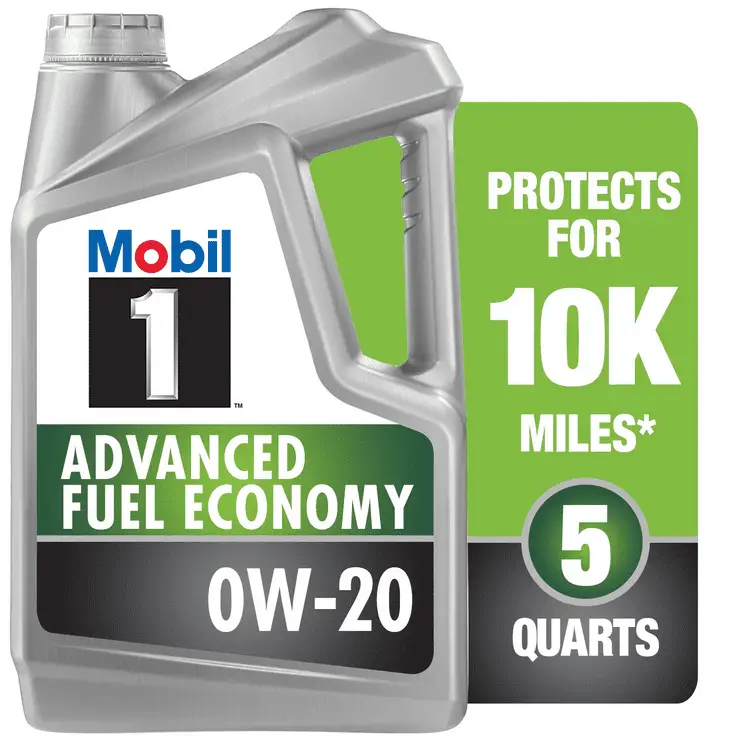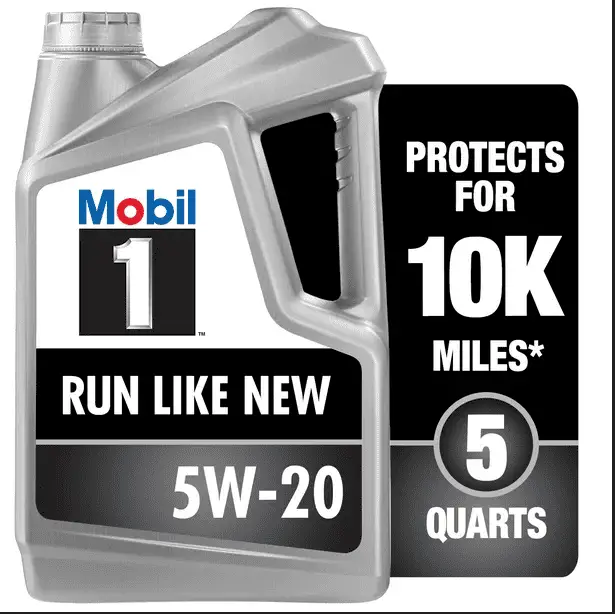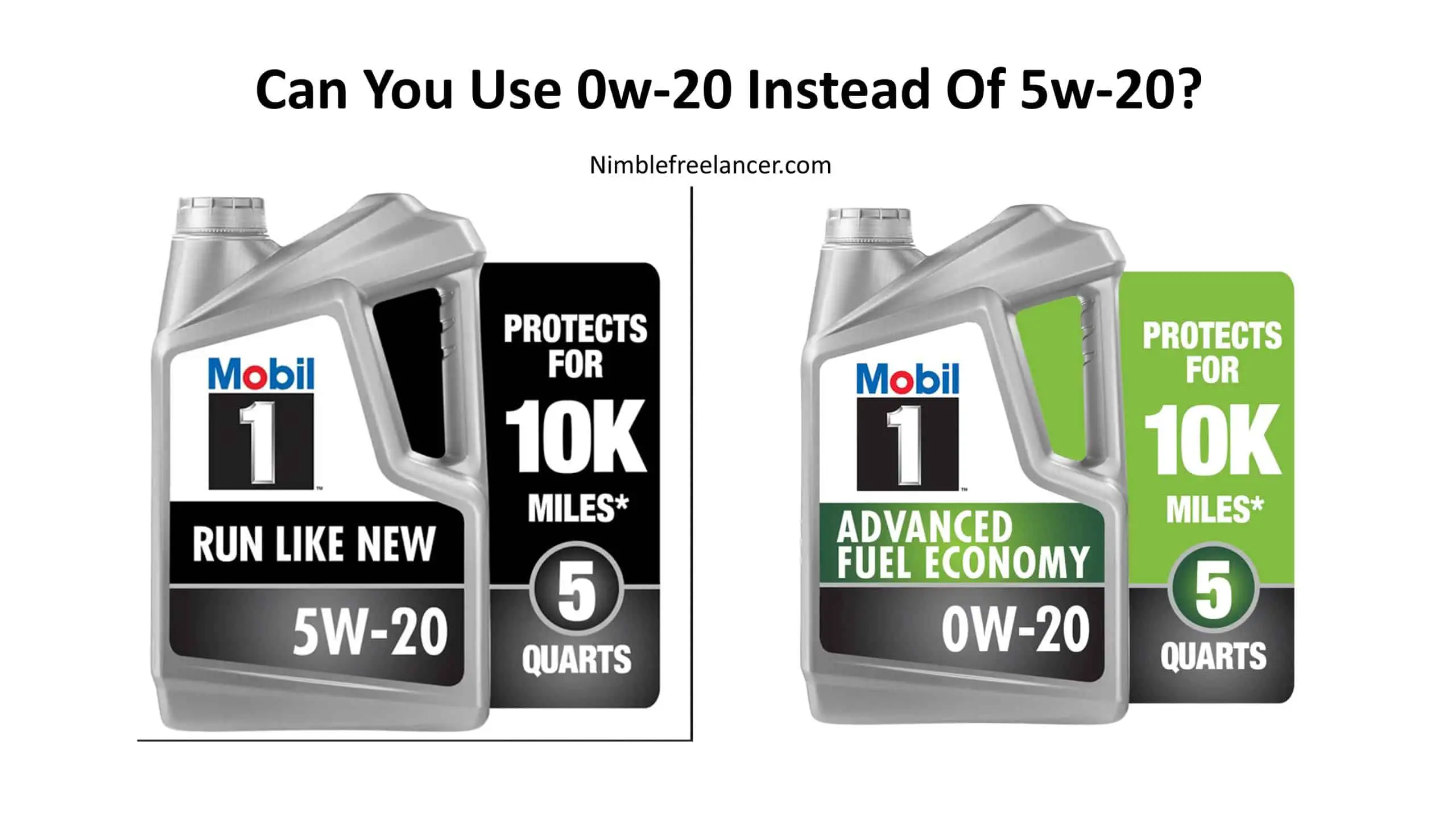Motor oil serves as the lifeblood of our engines, providing vital lubrication and protection to countless moving parts that work tirelessly to propel us forward. But it’s more than just a mere lubricant; it’s a shield against wear and tear, an engine performance enhancer, and a guardian against harmful contaminants.
Whether it’s the renowned 0W-20, the versatile 5W-20, or any other oil variant in between, we’ll reveal the strengths and advantages of each, allowing you to make informed choices for your cherished vehicles.
You can read our articles Can I Use 5w20 Instead of 5w30, which discusses a similar topic, and Can I Use 10w30 Instead of 5w30?
0w-20 Motor Oil
The 0W-20 motor oil is a synthetic motor oil that has recently gained popularity. It is known for its advanced formulation and benefits, particularly in fuel economy. Compared to conventional oils, 0W-20 motor oil has a lower viscosity rating, which means it flows more efficiently and reduces internal friction in the engine. This leads to improved fuel efficiency.

One notable advantage of 0W-20 motor oil is its performance in cold weather. The “0W” in the viscosity rating indicates that the oil has a very low viscosity when the engine is cold, allowing for easy startup and quick lubrication during cold starts. This property is especially beneficial in colder climates.
Despite its low viscosity, 0W-20 motor oil provides excellent engine protection. Its modern synthetic formulation offers enhanced lubrication properties, safeguarding critical engine components against wear, friction, and deposits. In addition, even oil maintains a stable film under high operating temperatures, ensuring optimum engine performance.
It is important to note that 0W-20 motor oil is designed for newer vehicles that require this specific viscosity grade. Vehicle compatibility is crucial, so consulting the owner’s manual is essential to determine if 0W-20 oil is recommended for your vehicle. Using the correct viscosity grade ensures compatibility with engine components and promotes optimal performance.
Some 0W-20 motor oils may offer extended oil change intervals compared to conventional oils. However, factors such as driving conditions, vehicle age, and manufacturer recommendations must be considered when determining oil change intervals. Following the guidelines provided by your vehicle manufacturer is crucial.
Regarding cost, 0W-20 motor oil generally costs more than conventional oils. On average, a 5-quart container of 0W-20 motor oil costs around $33. Although the initial cost may be higher, the improved performance and longer-lasting protection make it a cost-effective choice in the long run.
In summary, 0W-20 motor oil is a synthetic oil that offers improved fuel efficiency, excellent cold-weather performance, and engine protection. However, checking your vehicle’s specifications and following manufacturer recommendations is essential to ensure compatibility and optimal performance. Additionally, considering the average cost of around $33 for 5 quarts, weighing the benefits against the cost when choosing motor oil for your vehicle is essential.
5w-20 Motor Oil
The 5W-20 motor oil is a popular type that offers various benefits and is commonly used in modern vehicles. This synthetic oil has gained recognition for its performance and compatibility with multiple engines. Furthermore, compared to other viscosity grades, the 5W-20 motor oil possesses specific characteristics that make it a suitable choice for many vehicles.

One of the primary advantages of 5W-20 motor oil is its versatility in different temperature conditions. The “5W” in its viscosity rating signifies that the oil has a low viscosity when the engine is cold. This enables easy engine startup and quick lubrication, minimizing wear during cold starts. As a result, the 5W-20 oil contributes to smoother engine operation, especially in colder climates.
Besides cold-weather performance, 5W-20 motor oil maintains stable lubrication under high operating temperatures. This helps to protect critical engine components from wear, friction, and harmful deposits. The oil forms a reliable protective film that enhances engine performance and prolongs its lifespan.
Compatibility is essential when selecting motor oil, and 5W-20 oil is suitable for many modern vehicles. It is crucial to consult the vehicle’s owner’s manual to verify the recommended viscosity grade. Using the correct oil ensures optimal compatibility and performance while promoting fuel efficiency.
In terms of cost, 5W-20 motor oil is generally an affordable option. On average, a 5-quart container costs around $26, making it a cost-effective choice for regular oil changes and maintenance.
It is worth mentioning that oil change intervals may vary depending on driving conditions, vehicle age, and manufacturer recommendations. Following the manufacturer’s guidelines for oil change intervals is crucial to maintain engine health and performance.
In summary, 5W-20 motor oil is a versatile and widely used synthetic oil that provides benefits such as excellent cold-weather performance, engine protection, and compatibility with many modern vehicles. The recommended viscosity grade should be consulted in the vehicle’s owner’s manual. At an average cost of around $26 for a 5-quart container, 5W-20 motor oil offers affordability and performance benefits. Remember to adhere to manufacturer recommendations for oil change intervals to ensure optimal engine health and performance.
Can You Use 0w-20 Instead Of 5w-20?
Yes, you can typically use 0W-20 motor oil instead of 5W-20, as both have the same high-temperature viscosity. However, 0W-20 oil is thinner at lower temperatures than 5W-20, which will flow more readily in a cold engine in colder climates.

Both oils have the same operating temperature viscosity (20), the most critical factor for engine lubrication. The difference is the cold temperature viscosity: 0W is thinner at lower temperatures than 5W, which will flow more readily in a cold engine. This could provide better engine protection during cold starts, particularly in colder climates.
However, before making such a change, you must check your vehicle’s owner’s manual or consult your manufacturer or a qualified mechanic. Certain engines are designed with specific oil viscosities in mind, and using a different oil could lead to decreased performance or even engine damage.
In newer, incredibly fuel-efficient vehicles, the manufacturer often recommends lower-viscosity oils like 0W-20 because they reduce friction more effectively, thereby increasing fuel efficiency. However, in older engines, these lower-viscosity oils might not provide sufficient lubrication, especially if the engine parts have worn to the point where they require a thicker oil.
Always follow the vehicle manufacturer’s recommendations for the type and viscosity of oil to use in your vehicle. If your car is still under warranty, using a different kind of oil than the manufacturer recommends could void the warranty.
0w-20 vs. 5w-20
- Starting Viscosity
- 0W-20 Oil: This type of oil is designed to remain as thin as possible at cold temperatures. The “0W” in the name indicates that the oil will have a viscosity as close to “0” as possible when the engine is cold (the “W” stands for winter).
- 5W-20 Oil: The “5W” indicates that the oil will be slightly thicker than 0W-20 at cold temperatures.
- Cold Start Protection
- 0W-20 Oil: Due to its low viscosity when cold, it circulates faster in the engine, providing better protection during cold starts.
- 5W-20 Oil: While it still provides good protection, the slightly higher cold viscosity than 0W-20 means it may take marginally longer to circulate in the engine during cold starts.
- Fuel Economy
- 0W-20 Oil: It may provide a slightly better fuel economy than 5W-20 oil. This is because the lower viscosity reduces friction in the engine components, leading to better fuel efficiency.
- 5W-20 Oil: The fuel economy benefits are still noticeable compared to higher viscosity oils, but it may be slightly less fuel-efficient than 0W-20.
- Operating Temperature Viscosity
- 0W-20 Oil: 0W-20 and 5W-20 have the same viscosity at average operating temperatures (the “20” in their names indicates this). Therefore, there’s no difference between the two oils in this respect.
- Availability and Cost
- 0W-20 Oil: 0W-20 has an average cost of $33 for 5 quarts. Usually, this oil is slightly more expensive than 5W-20 oil because it’s a more specialized product. It also may not be as readily available.
- 5W-20 Oil: 5W-20 has an average cost of $26 for 5 quarts. This oil is more common and usually slightly less expensive than 0W-20.
- Vehicle Manufacturer Recommendations
- 0W-20 Oil: Some newer or specific vehicles may recommend or require using 0W-20 oil for optimal performance and fuel economy.
- 5W-20 Oil: Other vehicles, particularly older ones, may recommend 5W-20 oil.
Always use the oil weight your vehicle’s manufacturer recommends for your specific model and driving conditions.
